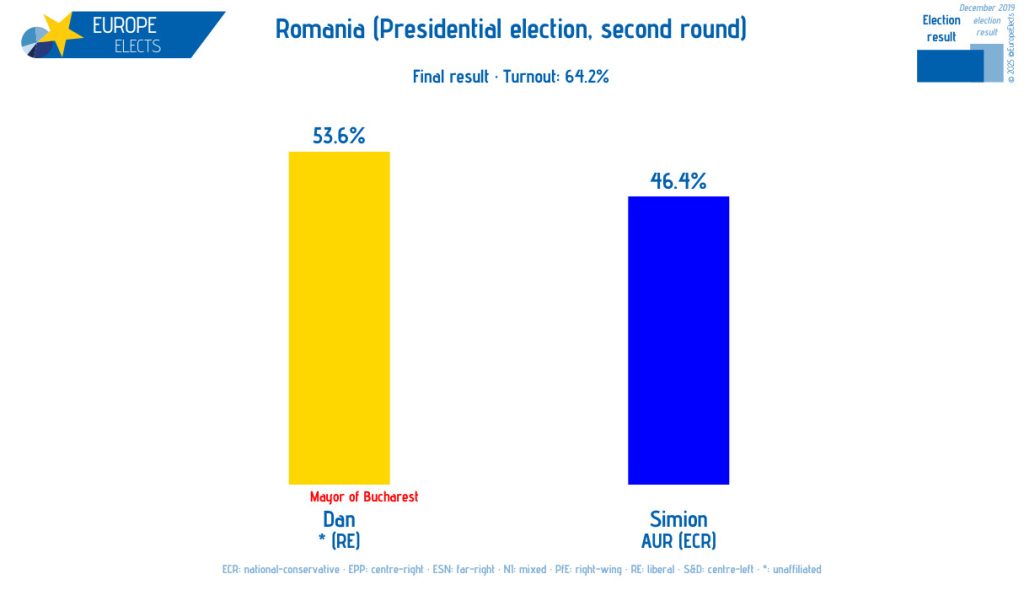Dan wins Romanian presidency, calming EU fears over ultranationalist Simion
Reading Time: 3 minutesIndependent pro-EU candidate Nicusor Dan won Romania’s presidential election on Sunday, 18 May, defeating far-right challenger George Simion in a runoff vote. The result represents a holding of the political centre after months of polarised campaigning, easing tensions in Brussels and Central and Eastern Europe (CEE).
Dan secured 53.6% of the vote, while Simion took 46.4%, according to official data. Turnout was 64.2%, the highest in nearly 3 decades. Analysts said this reflected the polarising nature of the race between pro-EU candidate Dan and Simion, whose far-right platform had raised concerns over potential Romanian foreign policy. The election rerun came after the annulment of November’s presidential vote due to alleged foreign interference.

CEE reponds to Dan victory
Dan, who ran with backing from several progressive parties, secured victory by uniting centrist, liberal and pro-EU voters. His win came after Simion dominated the first round against multiple candidiates earlier this month, raising fears of a major far-right breakthrough in Romania’s traditionally pro-mainstream voter base.
On Sunday evening, Dan framed the result as a choice for moderation and reform. Simion initially claimed victory but, as his defeat became apparent later, then merely pledged that his party would continue to represent its voters in Parliament.
Dan’s victory was welcomed by heads of state across CEE. “I look forward to further developing the strategic partnership between our friendly nations for the sake of their stability, security, and prosperity,” Ukrainian President Volodymyr Zelensky wrote on X.
Moldovan President Maia Sandu wrote that “Moldova and Romania stand together, supporting one another and working side by side for a peaceful, democratic, and European future for all our citizens.” In Hungary, government-aligned media acknowledged Simion’s defeat, describing it as a missed opportunity for nationalist forces.
EU officials in Brussels expressed relief that Romania had avoided a far-right presidency, but noted that the country’s divided parliament will remain a challenge for the incoming president. European Commission President Ursula von der Leyen tweeted that voters had chosen “the promise of an open, prosperous Romania in a strong Europe”.
Ethnic Hungarians helped swing election for Dan
Dan owed part of his victory in Sunday’s presidential run-off to the mobilisation of the country’s ethnic Hungarian minority, analysts said. The Democratic Alliance of Hungarians in Romania (UDMR), which represents the Hungarian minority concentrated in Transylvania’s Harghita, Covasna and Mures counties, in central Romania, endorsed Dan in the second round after adopting a neutral stance in the first.
Although turnout in Hungarian-majority areas was below the national average in the first round, it rose sharply in the run-off after UDMR leader Hunor Kelemen called on ethnic Hungarians to oppose Simion.
Simion’s anti-Hungarian rhetoric on the campaign trail, including calling the UDMR a “hideous, chauvinistic creature” and his past involvement in vandalising a Hungarian cemetery in 2019, alienated many voters in the minority community. Dan’s pro-EU stance and pledge to respect minority rights proved more attractive to ethnic Hungarians, who helped deliver him victory.
The result could mark a shift in the traditionally close relationship between Hungary’s ruling Fidesz party and the UDMR. Hungarian Prime Minister Viktor Orban’s reported behind-the-scenes support for Simion, despite his anti-Hungarian track record, has sparked anger among some in Romania’s Hungarian community.
The episode has raised questions over whether the UDMR will continue to align itself with Fidesz, or seek new political partnerships, as Romania enters a period of cohabitation between Dan and the left-leaning parliamentary majority.
Dan now faces the task of navigating a divided political system, where real governing power remains with the PSD-PNL-led parliament and government until legislative elections later this year.
Centre holds, but parliamentary election due later in 2025
As president, Dan’s powers are limited to foreign policy, defence and oversight, meaning his ability to influence domestic reforms will depend on cooperation with a fragmented legislature. The ruling Social Democratic Party (PSD) and the National Liberal Party (PNL) coalition will hold power until elections scheduled for late 2025, meaning Dan will need to negotiate across party lines to advance his agenda.
Political observers warned that while Dan’s victory represents a setback for the far right, Romania’s political and social divides remain unresolved. The parliamentary elections later this year will determine whether Dan’s presidency translates into broader political stability.
Dan’s win resets Romania’s political balance, but his ability to deliver on campaign promises will depend on whether he can build coalitions and maintain momentum in the months ahead. CEE analysts added that Dan’s victory could act as a reference point for centrist forces in other countries, demonstrating that coordinated campaigns can counter far-right advances.
Now Dan is expected to focus on strengthening EU ties, defending minority rights and balancing his limited presidential powers with a Parliament controlled by the left-leaning PSD-PNL alliance.

